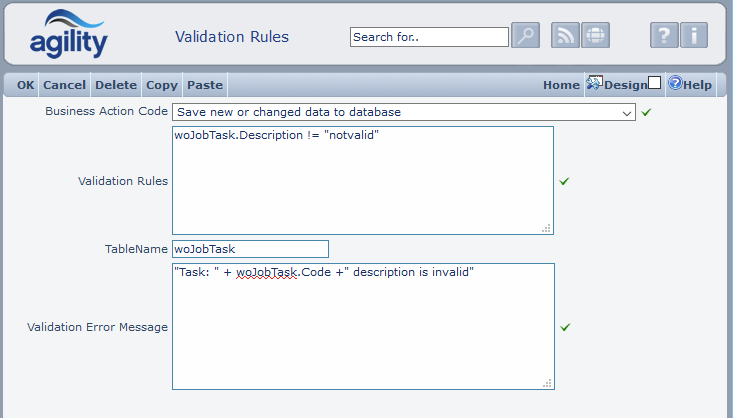Difference between revisions of "Business Rules"
(→Validation Rules) |
(→Validation Rules) |
||
| Line 12: | Line 12: | ||
==Validation Rules== | ==Validation Rules== | ||
| + | |||
| + | Allows to define custom validation rules for particular business object and business action. Validation rule is able to interrupt business action processing with predefined error message. | ||
For each defined '''Validation Rule''', calculated is Validation Rule string expression. When string expression evaluation result is equal '''false''' then business action is interrupted with Validation Error Message exception. | For each defined '''Validation Rule''', calculated is Validation Rule string expression. When string expression evaluation result is equal '''false''' then business action is interrupted with Validation Error Message exception. | ||
| Line 17: | Line 19: | ||
[[File:Validation_rule_details.png]] | [[File:Validation_rule_details.png]] | ||
| − | ;Busines Action Code | + | ;Busines Action Code |
| + | : Each Validation is triggered only for specified Business Action | ||
;Validation Rule | ;Validation Rule | ||
| + | : String Expression evaluated during business action processing, when evaluation result is equal '''false''' then business action is interrupted with Validation Error Message | ||
;TableName | ;TableName | ||
| + | : Table which will be used as default table during calculation. By default it is main table of business object. If specified table is child table then validation rule is evaluated in context of each record and multiple validation messages may appear. Table must exists in current dataset. | ||
;Validation Error Message | ;Validation Error Message | ||
: It is string expression which is evaluated in same context as Validation Rule, it should always output string. | : It is string expression which is evaluated in same context as Validation Rule, it should always output string. | ||
Latest revision as of 14:37, 2 September 2016
Business Rules allows definition of business process executed on business object level. Currently FastNET supports Default Values business rules as well as SQL-based business actions, which can be fired using standard FastNET mechanisms such as menu button on the form. Default Value rules allow assigning default values to database fields whenever business objects creates or changes data.
Contents
Default Value Rules
[subject waiting to be written...]
Business Actions
[subject waiting to be written...]
Validation Rules
Allows to define custom validation rules for particular business object and business action. Validation rule is able to interrupt business action processing with predefined error message.
For each defined Validation Rule, calculated is Validation Rule string expression. When string expression evaluation result is equal false then business action is interrupted with Validation Error Message exception.
- Busines Action Code
- Each Validation is triggered only for specified Business Action
- Validation Rule
- String Expression evaluated during business action processing, when evaluation result is equal false then business action is interrupted with Validation Error Message
- TableName
- Table which will be used as default table during calculation. By default it is main table of business object. If specified table is child table then validation rule is evaluated in context of each record and multiple validation messages may appear. Table must exists in current dataset.
- Validation Error Message
- It is string expression which is evaluated in same context as Validation Rule, it should always output string.
Business Parameters
[subject waiting to be written...]
Status Flow Definition
[subject waiting to be written...]
Notifications
[subject waiting to be written...]
